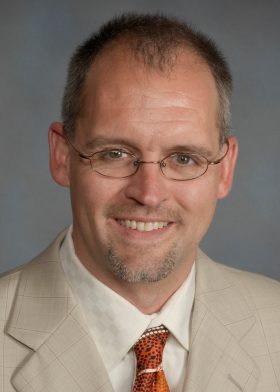Hall, a professor of exercise science, is co-director of the Elon BrainCare Research Institute and received the Distinguished Scholar Award from Elon last spring.
The public’s awareness about the short- and long-term impact of concussions on the brain and body has grown in recent years. The injuries and premature deaths of professional athletes who suffer concussions and mounting media interest in the topic are generating more questions about how to reduce the number of concussions and how to treat them when they occur.

Hall will deliver the the 2017 Distinguished Scholar Lecture on Thursday, Feb. 2, at 6:30 p.m. in LaRose Digital Theatre in the Koury Business Center.
“Awareness is increasing, and I think people are a lot more in tune with what concussions are,” Hall said. “I still think there are a lot of misconceptions and misunderstandings of the injury, though.”
Hall, who received Elon’s Distinguished Scholar Award last spring, began focusing on concussions about nine years ago through a collaboration with Elon’s Athletics Department that included performing baseline concussions testing on athletes that can be invaluable if a student-athlete is injured. That ongoing testing also provided Hall and his fellow researchers a large pool of data to hep delve into the impact of concussions on cognitive function, and has assisted in the development of “return-to-play” and “return-to-learn” guidelines for those who sustain concussions.
The collaboration and further research also led to the creation of Elon BrainCare, which now hosts a symposium each spring to discuss concussion treatment and management as well as other topics related to mental health and physical activity. This year, the symposium will be held on April 6.
“We still view the main role of what we’re doing her as serving the institution and our student athletes,” Hall said.
On Thursday, Hall will talk more about what led him to concussion research, as well as current research he and others are working on, along with an overview of the role of the Elon BrainCare Research Institute.
Tim Peeples, senior associate provost for faculty affairs and professor of English, said the annual Distinguished Scholar Lecture is a celebration of the “teacher-scholar” culture at Elon, and offers the chance for the broader university community to hear from those at the top of their fields.
“What many appreciate as perhaps unique to Elon and its teacher-scholar culture is the number of award winners who have also been recognized for excellence in teaching, mentoring, and service/leadership,” Peeples said. “The Distinguished Scholar talk offers us an opportunity each year to hear from one of Elon’s most accomplished scholars, a gathering important to sustaining an engaged, active community of teacher-scholars.”


